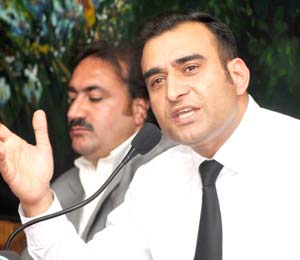 “Ashok’s office is in Sham Lal Sharma’s old residence in Jammu,” the source says. The trade of drugs in Jammu and Kashmir is one of the most profitable businesses worth over Rs 1000 crore.
“Ashok’s office is in Sham Lal Sharma’s old residence in Jammu,” the source says. The trade of drugs in Jammu and Kashmir is one of the most profitable businesses worth over Rs 1000 crore.
As the worms have started to come out, Affy Parenterals, a well-established pharmaceutical company based in Solan, Himachal Pradesh, is planning to file a case of defamation against Ashok and his company for using their name to establish their credentials.
“We never floated any tender to Jammu and Kashmir for any drug. We are waiting for the report of the committee and as soon as it is submitted with us our legal cell will take its action,” Geeta Jain, Managing Director, Affy Parenterals told Kashmir Life. The Mumbai-based Medlay Labs said that they had not authorized any party to supply Maximizin 625 to the hospitals in J&K.
Affy Parenterals is waiting for the report of a three member committee constituted by Commissioner Secretary Health and Medical Education, J&K government, and headed by Special Secretary to government, Health & Medical Education. The other two members in the committee are Financial Advisor Health & Medical Education and Controller, Drugs & Food organization. The committee has been asked to submit its report within 15 days. The committee was formed after a hue and cry was raised by civil society groups, doctors, drug associations and media.
The committee directed the Central Purchase Committee (CPC), Jammu, to immediately blacklist Lifeline Pharmaceutical Traders and Surgicals’. It also found a scapegoat in Controller Drug Stores, Kashmir, apparently for no fault of his as his only job was to supply what he was given by the designated CPC.
Various groups associated with the protests have begun to smell a rat, and a possible cover-up. The associations of doctors and chemists, pharmacist and different civil societies have rejected the committee and asked for an independent judicial probe. They argue that the present committee will not be able to do justice with the probe as one of its member, Controller, Drugs & Food organization, Satish Gupta, was a part of CPC which is being under scanner. “I may not be able to talk unless the committee’s report comes out. We are investigating the matter,” says Gupta.
The three drugs which were found to be spurious were approved and purchased, and their supply to government hospitals was given a nod by the Jammu based CPC. The state has three purchasing committees; one is based in Kashmir and all its members belong to the health sector of Kashmir. The second is Jammu-based and the last one consists of the members belonging to the dental colleges. All the three work on rotational basis to purchase required medicine for J&K for about 3 years. Last year, when the spurious drugs were supplied to Kashmir, it was Jammu based CPC’s tenure.
The availability of spurious drugs in Kashmir is not new. On April 15, Shabir Ahmed Khan, the state Health Minister told a delegation of Civil Society Forum Kashmir that about 146 drug samples were collected last year out of which 11 were found to be of sub-standard make. He termed it as a criminal case and assured that strict action would be taken against the guilty.
Experts say that the drug trade in Kashmir took an ugly turn in early 1990’s when the insurgency started. “In 1990, most of the genuine drug suppliers stopped working. Some fled and some left the job. This created a void which gave chance to a fleet of new suppliers. Some of them were genuine but most of them found a way of getting richer,” says Dr GQ Allaqaband, a valley based renowned Cardiologist.
“Rejecting them was not possible because Valley was suffering from serious shortage of medicines and medical equipment. So we had to compromise. It is still going on,” he says.
One of the most senior and reputed doctors of the state, DrAllaqband suggests that doctors must take their job seriously and keep a check on the medicines and their effects on the patients. “If a medicine is not making the required affect, the doctor should immediately report to his higher ups and so on. And a patient must be asked to purchase the medicine with a proper cash memo from the medical store so that if the medicine needs to be seized,the address of the store and supplier can be found easily,” he says.
It is not the suppliers alone who have found the drug market an easy way to get richer. Many doctors have been accused of misusing their position. Lucrative deals offered by different drug-manufacturing and supplying companies lure them to prescribe certain drugs which are sub-standard and can affect patients. The incentives offered these days range from a single pen costing few rupees to arranging tours to foreign countries and managing school fees of children, depending on the rank and popularity of particular doctor.
Recently, a doctor was sent on a tour to Singapore with his family by a pharmaceutical company, a senior doctor wishing not to be named, said. Last year, three different pharmaceutical companies managed the expense when their ‘client’ doctor got married.
“Prescribing tonic and vitamins on recommendation of pharmaceutical companies in view of getting incentives is acceptable,” says Dr Allaqaband, “but prescribing antibiotics and life-saving drugs for incentives is criminal and the doctor should be taken to task,” he says.















